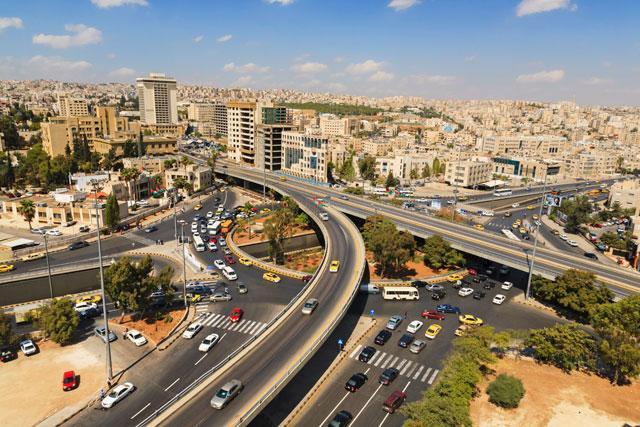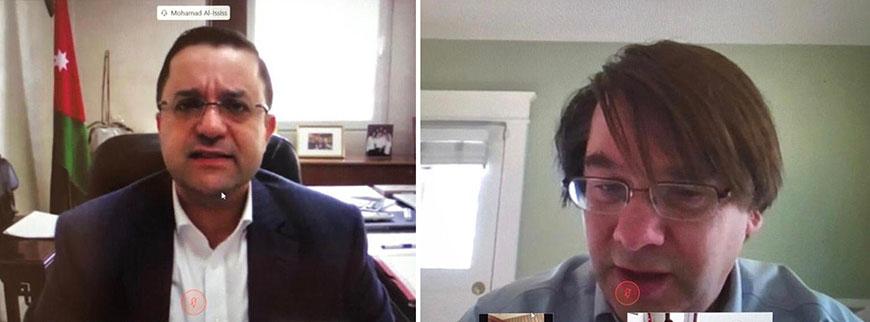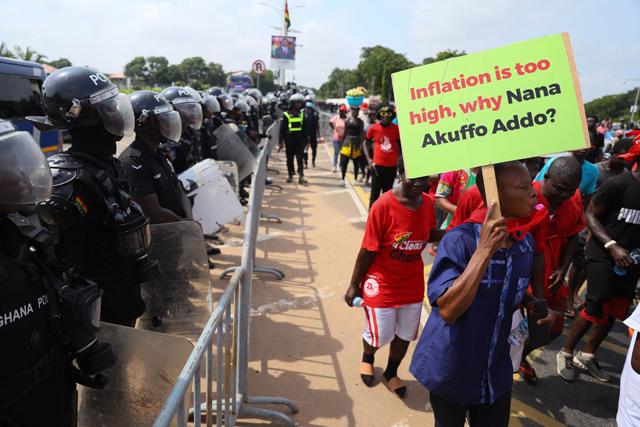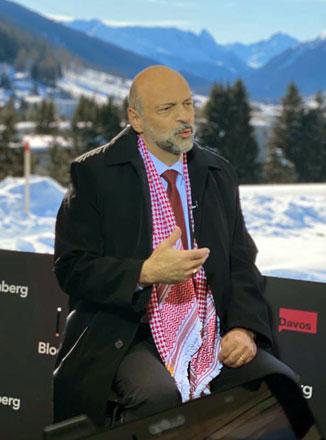You are here
IMF mission chief expresses confidence in Jordan’s crisis measures, recovery path
Apr 17,2020 - Last updated at Apr 17,2020

The executive board of the International Monetary Fund has approved Jordan’s four-year Extended Fund Facility in March, 2020 (File photo)
Following is the text of The Jordan Times’ interview with IMF Mission Chief to Jordan Chris Jarvis and Minister of Finance Mohamad Al-Ississ on Thursday:
Jordan Times: The executive board of the International Monetary Fund (IMF) approved Jordan’s four-year Extended Fund Facility. Does the programme fit or clash with the coronavirus?
Minister of Finance Mohamad Al-Ississ: The whole purpose of the recently endorsed Extended Fund Facility Programme with the IMF is to increase the resilience of the Jordanian economy. Little did we know that resilience is the name of the game today with the whole coronavirus situation.
The main pillars of the programme include lowering the cost of doing business, strengthening social protection and improving the efficiency and transparency of public services, in addition to issues such as digitisation and enhancing tax revenues from formalising the economy and expanding digital payments.
We agreed with the fund on an adjuster that would allow Jordan to spendwhatever is needed on the healthcare situation to counter this issue so that we do not have to worry about financing, because, first and foremost, this is a humanitarian issue and a crisis where human health is the first priority. The main lines of the programme are in line with what is needed for facing the crisis.
We will be revisiting the programme with the fund to reassess the macro framework and expectations, but I think now is the time for saving the private sector to the extent that we can and helping the economy become resilient in the face of this crisis, and ensuring that we expedite our structural reforms to achieve the objectives of the programme, which will help Jordan, upon concluding this crisis, to achieve the growth that it desires.
Jordan Times: How do you assess the impact of the coronavirus on Jordan and its ability to honour its commitments and the reform process, taking into account that you, the IMF, praised Jordan’s reform momentum in the past? How is the IMF supporting Jordan at this time?
IMF Mission Chief to Jordan Chris Jarvis: In terms of impact, we released our World Economic Outlook a couple of days ago that showed pretty much every country in the global economy having lower growth, or indeed negative growth, as a result of the virus outbreak, and Jordan is no exception. Essentially, we see output contracting in 2020 by about 3 to 4 per cent before rebounding in 2021. This is really a global phenomenon.
Something specific to Jordan — in terms of the other effects on Jordan — we would expect to see a higher budget deficit, bothbecause of more spending for health and for containment of the virus. Jordan is doing an exemplary job of doing that.
We would also expect revenue to be lower because the economy as a whole is not functioning at full speed. That affects budget revenue as well. Jordan is in a stronger position than other countries in regards to the balance of payment because, although there are some losses of income this year, especially in sectors like tourism, there are some gains because of Jordan being a major oil importer and the price of oil having gone down.
This crisis began to unfold as we were finishing negotiating the programme. And one of the things that we did, which has turned out to be very important, is to include what we call adjustments in the programme, which basically means that the fiscal targets will be revised automatically to allow for more spending on health and containment of the virus.
It was the first time that the IMF included a clause like that in an agreement due to the coronavirus and Jordan became a model for other countries to do that. I think that was very useful. And we also agreed on a mechanism to consult each other and talk to each other as the crisis unfolds.
The other thing we recognised was that the fiscal targets of the programme, especially in the short term, might need to be altered as we go along to reflect what's happening in the economy. With that, we are certainly prepared to do that. We don't need to do it yet. The first review of the programme would not be until the end of September or October. Then we have time to assess that. And we will certainly be flexible in reflecting on the effects of the crisis, which is beyond Jordan’s control.
And then finally, the other aspect to this is the question of whether Jordan needs more financial support. We have an instrument to help the countries with the crisis, called the Rapid Financing Instrument. About 90 countries have already requested support from that, because this is a global crisis that is not specific to Jordan. Jordan can also avail itself of that facility if it seems that that support is necessary.
It is not just the IMF, and we will also be mobilising support from others.
Jordan Times: How does the coronavirus impact the reform process in Jordan, taking into account that the IMF has praised the Kingdom on several occasions?
Minister of Finance: If anything, I believe Jordan will expedite its structural reforms. It is expected that COVID-19 will yield a global slowdown and a contraction in certain areas and Jordan will be impacted by that. Recapturing the momentum for growth should be our first and foremost priority. The sooner we can rebound from that, the sooner we can actually get into a V-shaped recovery rather than a U-shaped recovery and the less the negative impact will be of this crisis.
Therefore — while we are working around the clock to counter the negative impacts of the COVID-19 and to provide the first response — we have also been working over the past few weeks on what are the structural reforms that we can expedite and indeed capitalise on this opportunity to push forward.
I think given the concern that everybody has about using actual cash, this is a golden opportunity for us to provide the cultural paradigm shift towards e-payment.
There is no doubt that we have to recapture reforms on lowering the cost of business. And this is really putting a severe stress on our own businesses in the private sector. It is even more important now that we push those forward.
It would not be easy. I am not going to sugar coat it. We are stretched to the limit. We have fewer resources dedicated and we are being distracted by having to firefight the current situation. Having said that, we would be really failing to capture the warning signs that this crisis sends us if we don't, in parallel, work on going ahead with the structural reforms; we will not hide from doing what's needed.
I believe if anything, we need to expedite it. I have done multiple briefings to the Cabinet and others on the kind of structural measures we need to push forward, and we need to bring forward the calendar of implementation because of this.
Some things would have to be rethought. Some things have to be delayed. But the real fundamental pillars of the programme are completely what Jordan needs at this point to enhance its ability to withstand this global shock.
Jordan Times: What are the priorities at this stage and what you think the focus should be on? Do you believe there are reforms that can be postponed in light of the current conditions?
IMF Mission Chief: I think the first priority is to deal with the virus itself and to give priority to health spending and to measures to contain [the virus]. That's the essential condition for both saving lives and for getting the economy going again.
The next thing I would say is looking at the effects on the economy and what can be done to reduce the damage. On the budget side, one thing that can be done is making sure that the most vulnerable people are supported through transfers and social spending. And I know that's something that's on the priority list for the government. What is generally good advice in these situations is to give support that is timely, so that it is given quickly and is targetted so that it goes to people who really need it. And it's temporary, because you don't want to attack a short-term problem in a way that will tie up your budget for years. But that is the general principle on the fiscal side.
Obviously, Jordan has the peg, which is very important and needs to be protected, but there's limited flexibility on monetary policy. But the Central Bank of Jordan has been doing some good things and it was right to take the opportunity to lower interest rates along with the US Federal Reserve.
It has also extended liquidity to banks, which is an important part of this equation because then banks can extend liquidity to their borrowers. What is very important is to make sure that solvent businesses are preserved through this crisis, so that you don't let a shortage of liquidity turn into a major problem.
I completely agree with the minister that the structural reform agenda has become, if anything, even more important during this crisis. The fundamental goals of the programme were to raise Jordan’s growth, which has been low for years. Obviously, there is going to be a hit this year. But there's also an opportunity, as the economy rebounds, to put in place the structural reforms that will make the rebound more durable.
Similarly, Jordan is not going to be able to accomplish as much adjustment of the budget deficit this year as we had hoped and planned for, which is okay. But it is important not to lose sight of the medium-term objectives of beginning to put public debt on a downward path again to increase Jordan’s resilience.
I don't see a need for delaying reforms at the moment. But that's something that we can discuss with the government in the course of our next review of the programme. By that time, we should have a better chance to see how things are going and discuss any specific changes that need to be made.
Jordan Times: Your excellency, you said the approach should not be to cut spending, but to maintain and redirect expenditures. Can you explain this approach?
Minister of Finance: What we know from previous experiences that the world has faced and certain countries that have faced such deep contractions in their economies is that it is very important not to add to or exacerbate the problem by further cutting expenditures.
It is important for the government to play its role in helping the economy and provide automatic adjusters that slow down the impact. We will be reviewing our expenditures, as revenues will take a negative hit. Now we have new needs because of the situation and a need for spending on the safety net. We have fully prioritised our expenditure list.
Right now, as minister of finance, I believe I should have four expenditure priorities. Number one is making sure that the health apparatus and other apparatuses of society that are playing a very important role in fighting this virus have whatever they need in terms of resources to continue doing their work.
Number two: Expanding the safety net. There are daily wage labourers and informal sector workers that were not in need of safety nets and support before the crisis. And we have to make sure that we reach out to them and provide them with what is needed.
Number three is wages. The government will have to continue to pay its public sector wages in order to maintain spending ability and to maintain disposable income. During downturns or situations like this with high uncertainty, investments will slow down and there is disruption of trade. So we need to make sure that the other two elements of the economy — government and the household expenditure — keep going to maintain economic well-being.
Fourth priority: We need to focus on servicing our debt. Jordan will continue to service its debt and will continue to meet its external obligations. This, we believe, is very important to maintain the confidence of the private sector and of investors in the ability of Jordan not only to bypass or to move beyond this immediate crisis, but to regain its growth potential afterwards. These are our priorities at the moment.
Jordan Times: What do you think of Jordan’s approach not to cut spending, but to maintain and redirect expenditure? What is best to minimise the damage and accelerate the recovery? Do you believe the impact is a long-term one?
IMF Mission Chief: When you get into a global crisis like this, the general experience is that you get a permanent shock to the output, then the growth begins to recover. But then you've effectively lost a year or two of growth that you would otherwise have. And that makes life difficult for everyone. That said, the actions that countries take can make a difference to what the outcome is — whether you can get a V-shaped recovery or whether it's longer-lasting than that.
It's possible that the crisis in Jordan will be over earlier than in other countries because it has done such a good job of containment. But there will be a long-term effect, as tourism isn't going to recover overnight, because international travel is likely to continue to be disrupted even if things are good in Jordan. Faced with that, it's important that Jordan works on promoting rapid recovery.
Jordan Times: How do you view Jordan’s economic resilience going forward, given its recent experiences overcoming shocks and its current macroeconomic circumstances?
Minister of Finance: Sadly, Jordan hashad to withstand more than its fair share of external and exogenous shocks. Over the past decade, we havereceived exogenous shocks, roughly 40-44 per cent of our GDP, which is massive.
We have seen our energy supply disappear overnight and the way we responded to it was shifting very quickly to renewable energy.
We have seen borders closed. And we've learned to adapt by shifting to exporting digital services with a click of a button right now as we are under curfew and quarantine. We have companies, such as Expedia, functioning from their own homes in Jordan doing coding for their global needs out of Jordan. And this certainly enhances our ability to deal with the situation.
Jordan has learned over its centennial that the only way to be able to survive in this tough neighbourhood is to be open to adopting new ways of doing business as shocks increase. This is really how I see things. This is not to sugarcoat the situation. This will be a painful economic challenge.
And what we need to do is to go out of our way for those who are in need and, as Chris said very wisely, to help companies that are solvent but illiquid to be able to bypass this period.
What we have with the IMF is a beautiful, solid partnership. We talk very openly. I seek their advice and I think this gives me a lot of confidence in the ability of the economy of Jordan, with the support of the fund and the donor community partners, to bypass this.
You have heard Chris mention the willingness to provide Jordan with rapid financing instruments, which we will certainly capitalise on, to help provide the financing needs for the country. And this really is a manifestation of the positive, healthy relationship that we both have going forward.
I think what we need to do is to continuously respond to the needs of the markets.
When we started with actions to prevent the spread of the disease in Jordan, we came very early on with a package of economic decisions, lowering the social security contribution and delaying general sales tax payments and customs payments. The central bank has done really a tremendous job of facilitating monetary policy.
We've streamlined procedures for our customs and what we will do is we will continue to throw on the table more and more measures while maintaining the soundness of our fiscal policy to continue to respond to this issue.
We're not going to throw away everything we have on the table and then run out of our artillery. We're sequencing what the economy needs and how we respond to it. And this is a challenging time. It's a systematic shock across the whole world.
And what gives me hope and comfort is that we in Jordan moved on — preventing, tracking and treating the COVID-19 situation way ahead of the curve, which enabled us to significantly flatten the curve. Jordan was, I think, one of the earliest countries in adopting a fully fledged curfew when we hit, I think, six out of every million infections.
What we're hoping to achieve is to contain the local transmission of the virus, which will enable us to gradually and slowly open back our local economy while maintaining control of the borders. If we are able to achieve that quickly, that will make Jordan one of the very first countries whose economies are going back to functioning.
And with our pharmaceutical, sanitiser and agri-business industries, I think there is an opportunity to help facilitate the rebound, as other countries whose economies have not opened will be seeking our exports.
Jordan Times: Jordan was one of the first countries to impose strict measures to prevent a coronavirus outbreak. Was this the right decision to make for the economy, in comparison to other countries around the world? How do you see the measures taken so far by authorities to mitigate the economic impact of the crisis (eg. on the private sector, daily wage workers, etc.)?
IMF Mission Chief: Absolutely. Jordan was totally right to take these tough measures early on. I think that will really benefit Jordan over the coming weeks and months.
The government has already done a lot of stuff. Think about structural reforms, for example, all these long term important structural reforms like opening up, like having mandatory kindergartens and opening up early childhood education. Those were the prime minister's initiatives.
This is not the IMF designing an adjustment programme and giving it to Jordan. Jordan has its own adjustments, has its own measures.
So there's a lot of ownership by Jordan. It is a good partnership from our side as well, because we're working with people who take the initiative themselves. I think that was shown in the government's response to the coronavirus crisis as well. Now that they've acted fast, which is really important, and they've acted with determination. And, you know, we in the IMF, we're trying to put those same principles into effect in our own actions in relation to countries. We're also trying to be fast and we're trying to be flexible and we're trying to be effective.
So a lot of my confidence in Jordan comes from the fact that we're working with partners who've already shown that they are capable of taking action.
I think the second aspect of it is the design of this programme. It is a programme that emphasises growth and tries to accomplish an increase in growth and job creation that Jordan really needs. Within the fiscal elements of the programme, it emphasises improving tax collection and cutting back on tax exemptions rather than increasing tax rates. So I think we have a well-designed programme.
It's a long programme and countries get tired in long programmes. So it's going to be really important that the government and the central bank are prepared to stick to these efforts — both the structural adjustment and the fiscal reform efforts — over that relatively long period. And I think it'll be important also that the programme begins to show results in the first year or so.
The results won't be instant. Some of the benefits of structural reforms in particular take a long time to be felt across the economy as a whole, but they are felt, and it will be important to show progress towards those positive outcomes as we go ahead in the next couple of years.
There is great confidence in Jordan. In the last few months, the confidence of the international community in Jordan increased, and it tends to be self-reinforcing.
Jordan Times: What role do you envision for the donor community and international partners in Jordan during the next phase?
Minister of Finance: The international community as a whole has been increasing partnershipsto Jordan, which have been delivering a public good on behalf of the whole world in terms of hosting refugees and being an anchor of stability in the region.
This need will only be heightened because of COVID-19. The international community as a whole can play an enormous role in mitigating the impact of this sudden shock and the sudden increase in demand for public funds. What we need more than anything at this point is enhancing the lines of financing.
What the fund is trying to do is to be a catalytic supporter for further financing to Jordan by bringing the support of other development partners into the equation.
What we need is concessional financing. We need to be open to issues such as debt swaps and exchanges of various resources and the world community needs to move fast and not wait until the crisis worsens.
We continue to service refugee obligations and we need to make sure that the whole world is turning inwards in their needs to meet their own heightened domestic requestsand that Jordan continues to receive the support that it needs, and frankly, deserves.
There are a number of terrific initiatives by the fund and others with the help of the G20 to reach out to the poorest countries in the world. I call upon the global community to expand that support to lower middle-income countries such as Jordan, which is doing more than its fair share.
Jordan Times: What is your message to the international community and yourcommitment to supporting Jordan?
IMF Mission Chief: It is crucial. I worry a bit about the risk of that inward turning because every country is facing problems and they may be reluctant to support others. That is why I think institutions like the IMF and the World Bank make such an important contribution. Not only in financial terms, but in pointing out that what one country does affects others, and that a multilateral approach to solving global problems is really essential.
Applying that to Jordan, I think we need to step up and support and the World Bank needs to step up its support. I will be talking to the European Union later. There are other individual countries that have supported Jordan in the past and which I hope can do more at this time.
Jordan has made a tremendous contribution, especially in helping to address the refugee problem. It is providing an international public good to Europe and to the world in what it does to help refugees and is providing an essential humanitarian good.
Jordan deserves the support of the international community for that and for all of its other efforts. I guess if I have a final message, it would be that we at the IMF will continue to stand beside Jordan and we will continue to work to give the best advice we can to the Jordanian government and to encourage others to give Jordan the support it needs.
Related Articles
AMMAN — The International Monetary Fund (IMF) is ready to provide Jordan with support through its Rapid Financing Instrument, IMF Chief of M
ACCRA — Ghanaian trader Mohammed Biney was already struggling when the government passed a new tax on electronic money transactions this yea
Following is the full text of Prime Minister Omar Razzaz’s interview with New York-based Bloomberg News’ Francine Lacqua aired on Wednesday:


















